| Portrait | Name
Electoral District | Party | Term of Office | General
Elections | Ref | Government |
|---|
| Took office | Left office | Duration | Party | Cabinet | Prime Minister |
|---|
 | Shigeru Yoshida
Rep for
Kōchi
at-large
(1878-1967) | | Liberal | 24 May 1947 | 15 October 1948 | 1 year, 145 days | ー | | | Socialist | Katayama | Tetsu Katayama |
| Democratic Liberal | ー | | Democratic | Ashida | Hitoshi Ashida |
 | Tetsu Katayama
Rep forKanagawa 3rd
(1887-1978) | | Socialist | 15 October 1948 | 23 January 1949 | 93 days | 1949 | | | Democratic Liberal | Yoshida II | Shigeru Yoshida |
 | Takeru Inukai
Rep for
Okayama
2nd
(1896-1960) | | Democratic | 23 January 1949 | 10 February 1950 | 1 year, 19 days | ー | | Yoshida III |
Vacant
10 February 1950 - 28 April 1950 | | Liberal |
 | Gizo Tomabechi
Rep for
Aomori
1st
(1880-1959) | | National Democratic | 28 April 1950 | 8 February 1952 | 1 year, 287 days | ー | |
Vacant
8 February 1952 - 13 June 1952 |
 | Mamoru Shigemitsu
Rep for
Ōita
2nd
(1887-1957) | | Kaishintō | 13 June 1952 | 24 November 1954 | 2 years, 165 days | 1952 | |
| 1953 | Yoshida IV |
| ー | Yoshida V |
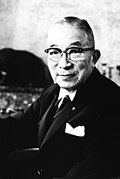 | Ichirō Hatoyama
Rep for
Tokyo
1st
(1883-1959) | | Japan Democratic | 24 November 1954 | 10 December 1954 | 17 days | ー | |
 | Taketora Ogata
Rep for
Fukuoka
1st
(1888-1956) | | Liberal | 10 December 1954 | 13 October 1955 | 308 days | 1955 | | | Japan Democratic | Hatoyama I | Ichirō Hatoyama |
| ー | Hatoyama II |
 | Mosaburō Suzuki
Rep for
Tokyo
3rd
(1893-1970) | | Socialist | 13 October 1955 | 23 March 1960 | 4 years, 163 days | ー | |
| ー | | Liberal Democratic | Hatoyama III |
| ー | | Liberal Democratic | Ishibashi | Tanzan Ishibashi |
| 1958 | | Liberal Democratic | Kishi I | Nobusuke Kishi |
| ー | Kishi II |
 | Inejirō Asanuma
Rep for
Tokyo
1st
(1898-1960) | | Socialist | 23 March 1960 | 12 October 1960 | 204 days | ー | |
| ー | | Liberal Democratic | Ikeda I | Hayato Ikeda |
 | Saburō Eda
(Acting)
Cou for
Okayama
at-large
(1907-1977) | | Socialist | 12 October 1960 | 6 March 1961 | 146 days | 1960 | |
| ー | Ikeda II |
 | Jōtarō Kawakami
Rep for
Hyōgo
1st
(1889-1965) | | Socialist | 6 March 1961 | 6 May 1965 | 4 years, 62 days | 1963 | |
| ー | Ikeda III |
| ー | | Liberal Democratic | Satō I | Eisaku Satō |
 | Kōzō Sasaki
Rep for
Miyagi
1st
(1900-1985) | | Socialist | 6 May 1965 | 19 August 1967 | 2 years, 106 days | 1967 | |
| ー | Satō II |
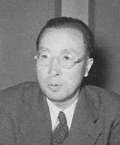 | Seiichi Katsumata
Rep for
Shizuoka
2nd
(1908-1989) | | Socialist | 19 August 1967 | 4 October 1968 | 1 year, 47 days | ー | |
Vacant
4 October 1968 - 30 November 1968 |
 | Tomomi Narita
Rep for
Kagawa
1st
(1912-1979) | | Socialist | 30 November 1968 | 13 December 1977 | 9 years, 14 days | 1969 | |
| ー | Satō III |
| 1972 | | Liberal Democratic | Tanaka I | Kakuei Tanaka |
| ー | Tanaka II |
| 1976 | | Liberal Democratic | Miki | Takeo Miki |
| ー | | Liberal Democratic | Fukuda | Takeo Fukuda |
 | Ichio Asukata
Mayor of
Yokohama
↓
Rep for
Tokyo
1st
(1915-1990) | | Socialist | 13 December 1977 | 7 September 1983 | 5 years, 269 days | ー | |
| 1979 | | Liberal Democratic | Ōhira I | Masayoshi Ōhira |
| 1980 | Ōhira II |
| ー | | Liberal Democratic | ー | Masayoshi Ito
Acting |
| ー | | Liberal Democratic | Suzuki | Zenkō Suzuki |
| ー | | Liberal Democratic | Nakasone I | Yasuhiro Nakasone |
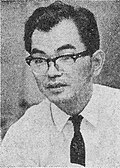 | Masashi Ishibashi
Rep for
Nagasaki
2nd
(1924-2019) | | Socialist | 7 September 1983 | 8 September 1986 | 3 years, 2 days | 1983 | |
| 1986 | Nakasone II |
| ー | Nakasone III |
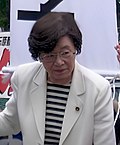 | Takako Doi
Rep for
Hyōgo
2nd
(1928-2014) | | Socialist | 8 September 1986 | 31 July 1991 | 4 years, 327 days | ー | |
| ー | | Liberal Democratic | Uno | Sōsuke Uno |
| 1990 | | Liberal Democratic | Kaifu I | Toshiki Kaifu |
| ー | Kaifu II |
| Makoto Tanabe
Rep for
Gunma
1st
(1922-2015) | | Socialist | 31 July 1991 | 19 January 1993 | 1 year, 173 days | ー | |
| ー | | Liberal Democratic | Miyazawa | Kiichi Miyazawa |
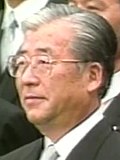 | Sadao Yamahana
Rep for
Tokyo
11th
(1936-1999) | | Socialist | 19 January 1993 | 9 August 1993 | 203 days | 1993 | |
 | Yōhei Kōno
Rep for
Kanagawa
5th
(born 1937) | | Liberal Democratic | 9 August 1993 | 30 June 1994 | 326 days | ー | | | Japan New | Hosokawa | Morihiro Hosokawa |
| ー | | Japan Renewal | Hata | Tsutomu Hata |
 | Tsutomu Hata
Rep for
Nagano
2nd
(1935-2017) | | Japan Renewal | 30 June 1994 | 10 December 1994 | 164 days | ー | | | Socialist | Murayama | Tomiichi Murayama |
 | Toshiki Kaifu
Rep for
Aichi
3rd
(1931-2022) | | New Frontier | 10 December 1994 | 28 December 1995 | 1 year, 19 days | ー | |
 | Ichirō Ozawa
Rep for
Iwate
2nd
↓
Rep for
Iwate
4th
(born 1942) | | New Frontier | 28 December 1995 | 31 December 1997 | 2 years, 4 days | ー | |
| 1996 | | Liberal Democratic | Hashimoto I | Ryutaro Hashimoto |
| ー | Hashimoto II |
 | Naoto Kan
Rep for
Tokyo
18th
(born 1946) | | Democratic | 31 December 1997 | 25 September 1999 | 1 year, 269 days | ー | |
| Democratic | ー |
| ー | | Liberal Democratic | Obuchi | Keizō Obuchi |
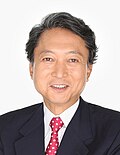 | Yukio Hatoyama
Rep for
Hokkaido
9th
(born 1947) | | Democratic | 25 September 1999 | 10 December 2002 | 3 years, 77 days | ー | |
| 2000 | | Liberal Democratic | Mori I | Yoshirō Mori |
| ー | Mori II |
| ー | | Liberal Democratic | Koizumi I | Junichiro Koizumi |
 | Naoto Kan
Rep for
Tokyo
18th
(born 1946) | | Democratic | 10 December 2002 | 18 May 2004 | 1 year, 161 days | 2003 | |
| ー | Koizumi II |
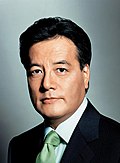 | Katsuya Okada
Rep for
Mie
3rd
(born 1953) | | Democratic | 18 May 2004 | 17 September 2005 | 1 year, 123 days | 2005 | |
 | Seiji Maehara
Rep for
Kyoto
2nd
(born 1962) | | Democratic | 17 September 2005 | 7 April 2006 | 203 days | ー | |
| ー | Koizumi III |
 | Ichirō Ozawa
Rep for
Iwate
4th
(born 1942) | | Democratic | 7 April 2006 | 16 May 2009 | 3 years, 40 days | ー | |
| ー | | Liberal Democratic | Abe I | Shinzo Abe |
| ー | | Liberal Democratic | Fukuda | Yasuo Fukuda |
| ー | | Liberal Democratic | Asō | Tarō Asō |
 | Yukio Hatoyama
Rep for
Hokkaido
9th
(born 1947) | | Democratic | 16 May 2009 | 16 September 2009 | 124 days | 2009 | |
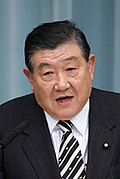 | Masatoshi Wakabayashi
(Acting)
Cou for
Nagano
at-large
(1934-2023) | | Liberal Democratic | 16 September 2009 | 28 September 2009 | 13 days | ー | | | Democratic | Hatoyama | Yukio Hatoyama |
 | Sadakazu Tanigaki
Rep for
Kyoto
5th
(born 1945) | | Liberal Democratic | 28 September 2009 | 26 September 2012 | 2 years, 365 days | ー | |
| ー | | Democratic | Kan | Naoto Kan |
| ー | | Democratic | Noda | Yoshihiko Noda |
 | Shinzo Abe
Rep for
Yamaguchi
4th
(1954-2022) | | Liberal Democratic | 26 September 2012 | 26 December 2012 | 92 days | 2012 | |
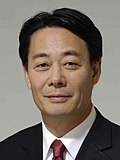 | Banri Kaieda
Rep for
Tokyo
PR block
(born 1949) | | Democratic | 26 December 2012 | 15 December 2014 | 1 year, 355 days | 2014 | | | Liberal Democratic | Abe II | Shinzo Abe |
Vacant
15 December 2014 - 18 January 2015 | Abe III |
 | Katsuya Okada
Rep for
Mie
3rd
(born 1953) | | Democratic | 18 January 2015 | 15 September 2016 | 1 year, 242 days | ー | |
| Democratic | ー |
 | Renhō
Cou for
Tokyo
at-large
(born 1967) | | Democratic | 18 September 2016 | 1 September 2017 | 352 days | ー | |
 | Seiji Maehara
Rep for
Kyoto
2nd
(born 1962) | | Democratic | 1 September 2017 | 22 October 2017 | 52 days | 2017 | |
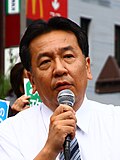 | Yukio Edano
Rep for
Saitama
5th
(born 1964) | | Former
Constitutional Democratic | 22 October 2017 | 30 November 2021 | 4 years, 40 days | ー | | Abe IV |
| Constitutional Democratic | ー |
| ー | | Liberal Democratic | Suga | Yoshihide Suga |
| 2021 | | Liberal Democratic | Kishida I | Fumio Kishida |
| ー | Kishida II |
 | Kenta Izumi
Rep for
Kyoto
3rd
(born 1974) | | Constitutional Democratic | 30 November 2021 | 23 September 2024 | 2 years, 299 days | ー | |
 | Yoshihiko Noda
Rep for
Chiba
4th
↓
Rep for
Chiba
14th
(born 1957) | | Constitutional Democratic | 23 September 2024 | Incumbent | 221 days | ー | |
| 2024 | | Liberal Democratic | Ishiba I | Shigeru Ishiba |
| ー | Ishiba II |




































